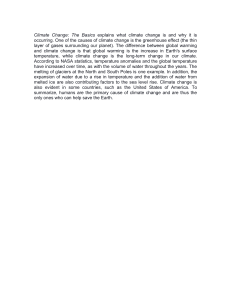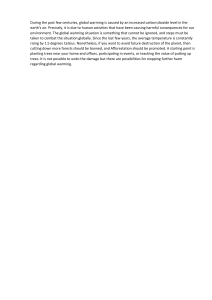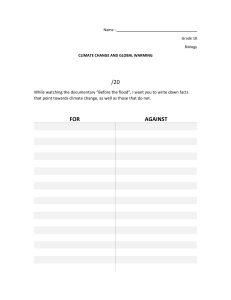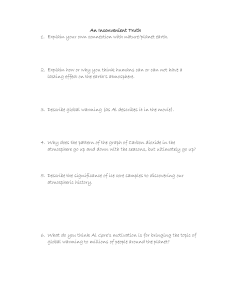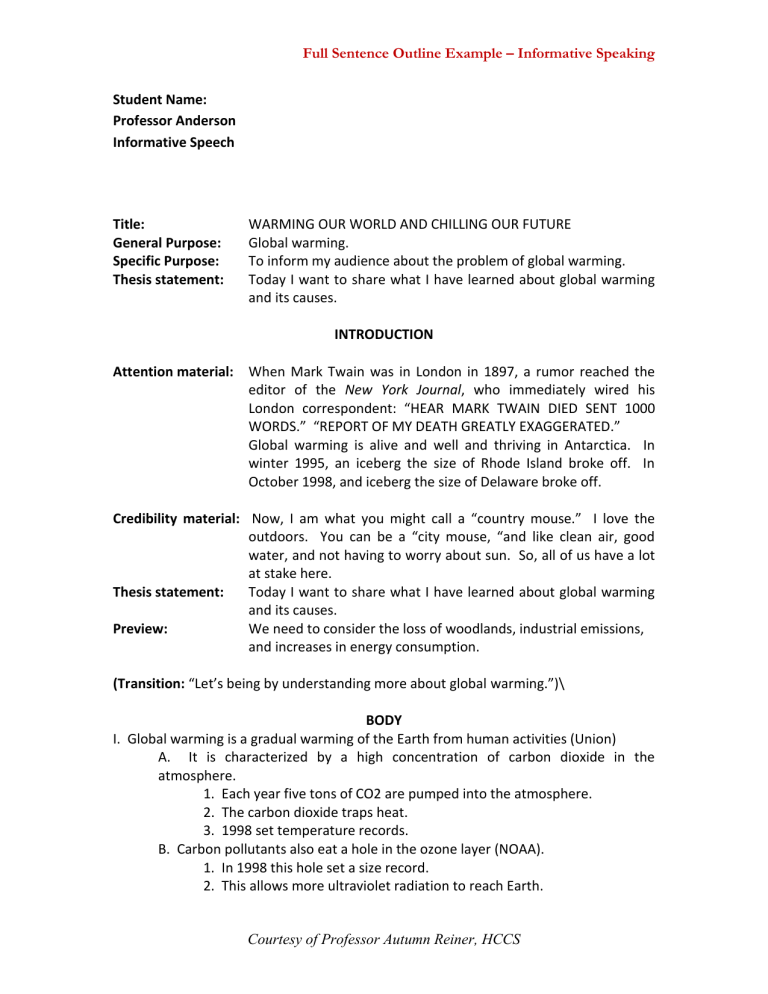
Full Sentence Outline Example – Informative Speaking Student Name: Professor Anderson Informative Speech Title: General Purpose: Specific Purpose: Thesis statement: WARMING OUR WORLD AND CHILLING OUR FUTURE Global warming. To inform my audience about the problem of global warming. Today I want to share what I have learned about global warming and its causes. INTRODUCTION Attention material: When Mark Twain was in London in 1897, a rumor reached the editor of the New York Journal, who immediately wired his London correspondent: “HEAR MARK TWAIN DIED SENT 1000 WORDS.” “REPORT OF MY DEATH GREATLY EXAGGERATED.” Global warming is alive and well and thriving in Antarctica. In winter 1995, an iceberg the size of Rhode Island broke off. In October 1998, and iceberg the size of Delaware broke off. Credibility material: Now, I am what you might call a “country mouse.” I love the outdoors. You can be a “city mouse, “and like clean air, good water, and not having to worry about sun. So, all of us have a lot at stake here. Thesis statement: Today I want to share what I have learned about global warming and its causes. Preview: We need to consider the loss of woodlands, industrial emissions, and increases in energy consumption. (Transition: “Let’s being by understanding more about global warming.”)\ BODY I. Global warming is a gradual warming of the Earth from human activities (Union) A. It is characterized by a high concentration of carbon dioxide in the atmosphere. 1. Each year five tons of CO2 are pumped into the atmosphere. 2. The carbon dioxide traps heat. 3. 1998 set temperature records. B. Carbon pollutants also eat a hole in the ozone layer (NOAA). 1. In 1998 this hole set a size record. 2. This allows more ultraviolet radiation to reach Earth. Courtesy of Professor Autumn Reiner, HCCS Full Sentence Outline Example – Informative Speaking C. If this problem is not corrected; we may see disastrous results (National Issues Forums) 1. There could be dramatic climate changes a. There could be drought in the middle of continents b. There could be many severe storms c. There could be rising sea levels that would destroy coastal areas 2. There could be serious health problems a. There could be an increase in skin cancer b. There could be an increase in cataracts c. There could be damaged immune systems (Transition: Now that you understand what global warming is an why it is important, let’s examine its major causes.) II. The loss of woodlands adds to global warming (Union) A. One football-field-sized area of forest is lost every second B. Some loss occurs through cutting trees C. Burning adds more carbon dioxide form smoke (Transition: An even greater cause of global warming……) III. Industrial emissions accelerate global warming (Union) A. These account for more than 20 percent of our air pollution B. Americans are the worst offenders 1. We use 26 percent of the world’s oil 2. We release 26 percent of nitrogen oxides 3. We release 22 percent of carbon dioxide. C. There is light on the horizon. 1. The rate of emission is slowing (Dept. of Energy) 2. Companies are uniting to arrest climate change (“New Initiative”) (Transition: “Finally, we come to the biggest cause of global warming--- ourselves”) IV. Personal energy consumption magnifies global warming (Union) A. Energy consumption is the single largest cause of global warming 1. Fossil fuel use accounts for 90 percent of America’s energy consumption 2. Transportation-related energy accounts for half of all air pollution B. America is on an energy binge (Myerson) 1. We are using more fuel in our homes a. New homes are much larger Courtesy of Professor Autumn Reiner, HCCS Full Sentence Outline Example – Informative Speaking B People have more energy-hungry equipment 2. We are using more fuel for transportation a. Commutes are longer b. Vehicle horsepower is increasing c. People are buying gas-guzzlers CONCLUSION Summary statement: In conclusion, if you want to know why we have global warming, listen for the falling trees, watch the industrial smokestacks darkening the sky, and smell the exhaust fumes we are pumping into the air. Concluding remarks: Gore story on how global warming can sneak up on us. Addressing the National Academy of Sciences, the vice president said, “If dropped into a pot of boiling water, a frog will quickly jump out. But if the same frog is put into a pot and the water is slowly heated, the frog will stay put until boiled alive. So it is with pollution…. If we do not wake up to the slow heating of our environment, we may jump too late.” The more we know about global warming, the more likely we are to jump and the less likely we are to be cooked. REFERENCES (USE APA STYLE) Courtesy of Professor Autumn Reiner, HCCS
